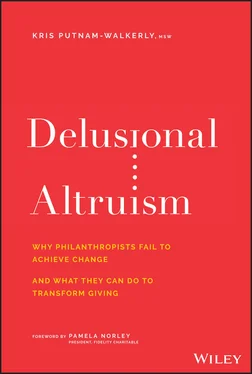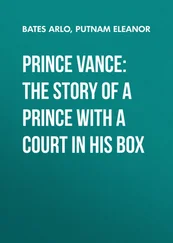Surprisingly, the scarcity mind-set has little to do with money. It has everything to do with belief.
Scarcity-minded donors believe that investment in their own operation is only warranted when the need is urgent. They limit their opportunities based on current capacity, not potential impact. Improvements they make, therefore, are only incremental. They feel they should always do more with less. In fact, they often believe they don't deserve what's best, fastest, or most efficient.
After advising ultra-high-net-worth donors and philanthropy leaders for more than 20 years, I believe this scarcity mentality is one of philanthropy's most detrimental self-created restraints.
The problem with a scarcity mentality is that it hinders your talent, stalls your creativity, and hijacks your opportunities to create systemic change. And it seeps into just about every aspect of philanthropic giving.
I realize you don't want to hear this. You don't want to be a glass-half-empty philanthropist! No one does. But read on. Part of what makes “delusional altruism” so delusional is that we get in our own way without realizing it . Let's learn about how we inadvertently allow a scarcity mentality to creep into our lives.
A scarcity mentality is the lens with which many donors view their philanthropy. It's important to understand that this is a belief system that misguides your thinking. It's a trickster. It fools you into believing that you are saving money. That the less you invest in your talent, infrastructure, and knowledge, the more you can help others.
This is of course ridiculous. The deceptive scarcity mentality is all in your head.
Before we talk about the ways that the scarcity mentality shows up in philanthropists' lack of investment, I want to talk about the guises it takes in your mind.
This happens most often when you don't trust yourself to make a decision, you limit yourself based on your current capacity, you believe you don't deserve something, or you believe you are too small to make a difference.
Not Trusting Yourself to Make a Decision
Too often, funders don't trust themselves to make decisions. Instead, without realizing it, they shroud themselves in a blanket of “more information.” Here's how it works: You know (or are pretty darn sure you know) the answer. Then, you waste lots of time and money reassuring yourself you're right.
Here's an example: The leader of a corporate foundation wanted to hire a consultant. Two consultants were recommended highly. Still, she wasn't sure whom to choose, so she cast a wider net. She spent months developing a request for proposals (RFP) to find a consultant and another few weeks disseminating it widely. Next, she spent two months sifting through the dozens of proposals she'd received, scheduling and conducting interviews with finalists, selecting one consultant, and negotiating the contract. Six months later, she is ready to make the hire. Unfortunately, she's now lost half a year of her time, wasted countless hours of dozens of consultants' time, her project is delayed, she's behind in her other work, and the people her company is ultimately trying to help have been forced to wait—again.
What's even worse? After all that time and money she spent to find the consultant, she probably didn't find the best one. Why? Top talent in high demand wouldn't waste that much time applying!
Why do philanthropists do this to themselves? Their scarcity mind-set holds them back. They don't trust themselves to make decisions.
Look, sometimes the people involved genuinely don't know something, and they need to take time to learn. I get it. But in this example, the leader was smart. Think of how much better off everyone would have been had she met with each of the two recommended consultants, plus a couple more she could have easily found by asking trusted colleagues, and simply made a decision.
Limiting Yourself Based on Your Current Capacity
Too often funders say, “I can't” because they look at their current capacity and abilities and simply cannot imagine taking on a new task.
Does this ever happen to you or your colleagues? You postpone a project of strategic importance because you are “too busy” right now. You decide you can't address the root causes of a problem because you don't have enough funds, so instead you fund projects to address the symptoms. You decide not to fund something because you don't know enough about the issue. You choose not to ask community members to inform your funding strategy because you don't feel equipped to address the issues they might raise.
Here's the thing: You might be busy, lacking information, and ill equipped. You might not have enough funds to adequately address the root cause. Great! Now we know where you stand.
But, then again, so what? Your current capacity, knowledge, ability, and funds shouldn't limit the transformational change you can create. You can increase your capacity, gain new knowledge, equip yourself, and leverage additional dollars. It might not be easy. It might take time. And you will probably experience a few bumps and scrapes along the way. That's just fine.
Believing You Don't Deserve Something
Too often, philanthropists feel they don't deserve to [fill in the blank], such as invest in themselves, retain an executive coach, fund a needs assessment, attend a conference, improve their technology, hire top talent, spend time learning with other philanthropists, share their accomplishments publicly, learn how they can advocate for policy change, or fund an evaluation.
Why? Because they have a misguided belief that all their money should go to help others.
This is especially pervasive in family philanthropy, among those who have inherited wealth, and among entrepreneurs who have earned their own wealth. But it's true for most any philanthropist.
Mind you, they might simultaneously be spending $15,000 to graphically design, print, and mail hard copies of their annual report; budgeting $30,000 for new marble kitchen countertops for their third vacation home; spending $100,000 annually to mist the plants at corporate headquarters; or forking over half a million dollars annually on fuel for their private jets.
But when it comes to charitable giving, scarcity rules the roost!
This belief might appear noble. In reality, it is delusional. In order to have the greatest philanthropic impact, you need to be the greatest philanthropist you can be. This involves understanding yourself, understanding the issues and communities you want to help, and investing time and resources to build your philanthropic muscle and know-how.
To help others, you first need to help yourself.
Believing You Are Too Small to Make a Difference
Not every philanthropist is a billionaire. You might be giving away thousands of dollars each year, not hundreds of millions. But a small funder should not limit its aspirations. Even donors with limited means can operate with an abundance mind-set. The world is rife with examples of small funders that created big impact. In fact, Exponent Philanthropy, a U.S.-based network of foundations with few or no staff, philanthropic families, and individual donors, regularly showcases members who achieve “outsized impact” compared to their size.
Too often, however, funders of all sizes believe they are too small to make a difference.
One philanthropy leader had this kind of poverty mind-set when it came to achieving her strategic goals. Her organization organized high-net-worth members to donate to progressive causes. They set specific goals of tripling the number of donor members and dramatically influencing how those donors allocated their funding.
Читать дальше












